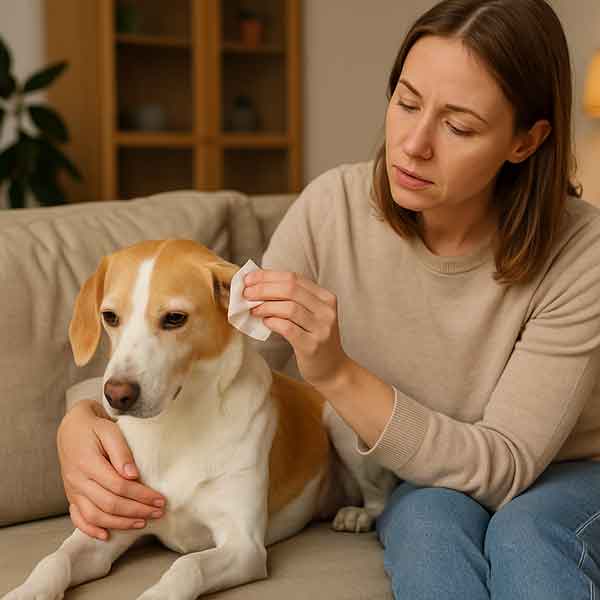How to Cure Dog Allergies? | Remedies & Treatment Guide
Is your dog constantly scratching, licking, or sneezing? Allergies in dogs are more common than you might think, and they can cause significant discomfort if left untreated. This article explores how to cure dog allergies, including identifying the root cause, treatment options, home remedies, and preventive care. Whether your dog suffers from seasonal allergies, food intolerances, or skin irritation, we’ve got you covered.
Table of Contents
- What Are Dog Allergies?
- Common Symptoms of Dog Allergies
- Types of Dog Allergies
- How to Diagnose Allergies in Dogs
- Medical Treatments for Dog Allergies
- Natural Remedies for Dog Allergies
- Prevention Tips to Avoid Allergy Triggers
- Frequently Asked Questions
What Are Dog Allergies?
Dog allergies occur when a dog’s immune system reacts to a foreign substance—called an allergen—that is typically harmless. This reaction causes inflammation, itchiness, and other uncomfortable symptoms. Allergens can be inhaled, ingested, or come into contact with the skin.
Common Symptoms of Dog Allergies
Recognizing the symptoms early can help you seek treatment quickly. Here are some signs your dog might be suffering from allergies:
- Persistent scratching or chewing
- Red, inflamed, or irritated skin
- Excessive licking (especially paws or belly)
- Hair loss or hot spots
- Ear infections or head shaking
- Watery eyes or sneezing
- Digestive issues (vomiting or diarrhea)
Types of Dog Allergies
To effectively treat dog allergies, it’s essential to understand the type of allergy your dog is experiencing:
1. Environmental Allergies
Caused by allergens like pollen, dust mites, mold, or grass. Often seasonal, these allergies trigger respiratory and skin symptoms.
2. Food Allergies
Reactions to specific ingredients in your dog’s diet, such as chicken, beef, dairy, or grains. Common symptoms include ear infections, itchy skin, and gastrointestinal upset.
3. Flea Allergy Dermatitis
Even one flea bite can cause a severe reaction in dogs with flea allergies. It often results in intense itching and inflammation, particularly near the tail base.
4. Contact Allergies
Triggered by substances that come into contact with the dog’s skin, such as certain shampoos, cleaning products, or synthetic fabrics.

How to Diagnose Allergies in Dogs
Veterinarians use a combination of history, physical exams, and diagnostic tests to identify allergies:
- Elimination Diet: Used to detect food allergies by switching to a limited-ingredient diet.
- Skin Tests: Performed by a veterinary dermatologist to pinpoint environmental allergens.
- Blood Tests: Help identify allergy triggers, though results can vary in accuracy.
Medical Treatments for Dog Allergies
Depending on the type and severity, your vet may recommend the following dog allergy treatments:
1. Antihistamines
Common medications like Benadryl can reduce itchiness, though effectiveness varies by dog.
2. Steroids (Corticosteroids)
Used for short-term relief of severe symptoms, but not ideal for long-term use due to side effects.
3. Apoquel or Cytopoint
These modern, targeted medications provide effective and fast allergy relief without the downsides of steroids.
4. Antibiotics or Antifungals
Prescribed if your dog has developed secondary infections from constant licking or scratching.
5. Immunotherapy (Allergy Shots)
Custom injections based on allergy tests, gradually desensitizing your dog to allergens over time.
Natural Remedies for Dog Allergies
If you’re looking for holistic options, here are some safe and natural ways to soothe your dog’s allergies:
- Oatmeal Baths: Help soothe inflamed, itchy skin.
- Coconut Oil: Has antimicrobial properties and can be applied topically or added to food (in moderation).
- Apple Cider Vinegar Spray: Diluted 50/50 with water, it can relieve minor itchiness and restore pH balance.
- Fish Oil Supplements: Rich in omega-3 fatty acids, which help reduce inflammation and support skin health.
- Probiotics: Aid in gut health, which is directly linked to immune function and allergy control.
Always consult your vet before introducing new supplements or remedies.
Prevention Tips to Avoid Allergy Triggers
While not all dog allergies can be cured, many can be managed or minimized through consistent care:
- Flea Control: Use vet-approved flea preventatives year-round.
- Frequent Grooming: Regular baths and brushing remove allergens from your dog’s coat.
- Clean Environment: Vacuum regularly, wash bedding, and use air purifiers to reduce indoor allergens.
- Hypoallergenic Diet: Choose limited-ingredient or novel-protein dog foods if food allergies are suspected.
- Avoid Known Triggers: If your dog is allergic to grass, walk them on pavement or keep the lawn trimmed.
Frequently Asked Questions
Can dog allergies be completely cured?
In many cases, allergies can be managed rather than cured. However, treatments like immunotherapy can offer long-term relief.
What is the fastest way to stop my dog’s itching?
Medications like Apoquel or a vet-approved antihistamine can provide quick relief. Also try soothing baths with oatmeal or aloe-based shampoos.
How do I know if my dog has a food allergy?
Elimination diets are the gold standard for diagnosing food allergies. Work with your vet to remove potential allergens one by one.
Are there hypoallergenic dog breeds?
No dog is truly hypoallergenic, but some breeds like Poodles and Bichon Frises produce fewer allergens.
Can I give my dog Benadryl for allergies?
Yes, but dosage depends on your dog’s weight. Always consult your vet before administering any over-the-counter medication.
Conclusion
Knowing how to cure dog allergies begins with understanding your dog’s unique triggers. From medical treatments and home remedies to prevention strategies, you can help your dog live a more comfortable and happy life. With the right combination of care, many dogs experience significant relief—and so will you, knowing your furry friend is no longer suffering.


